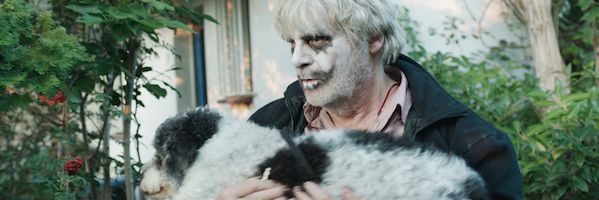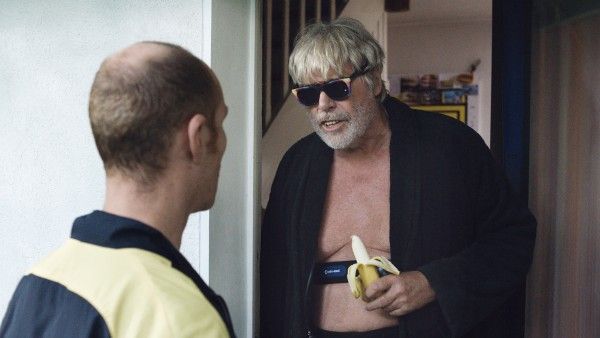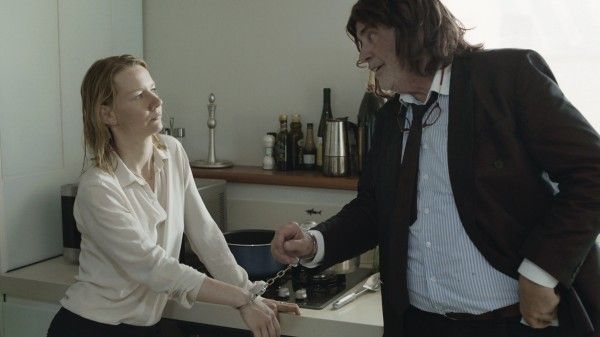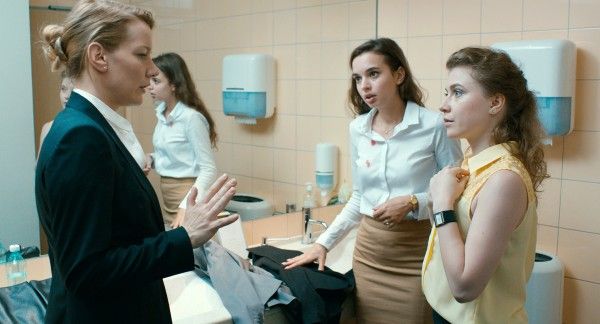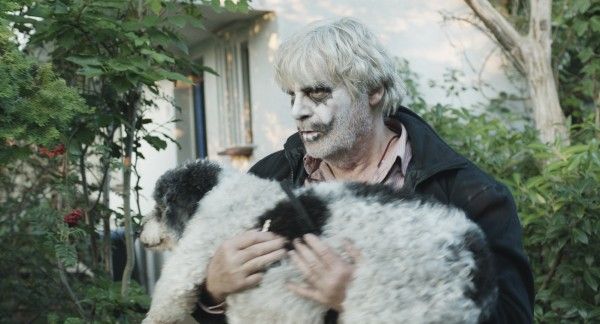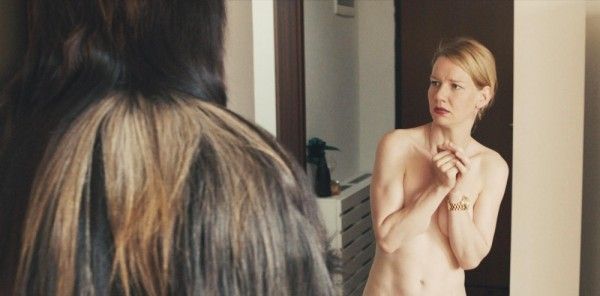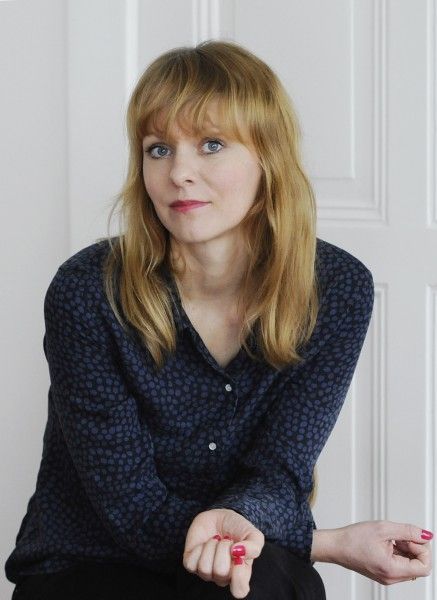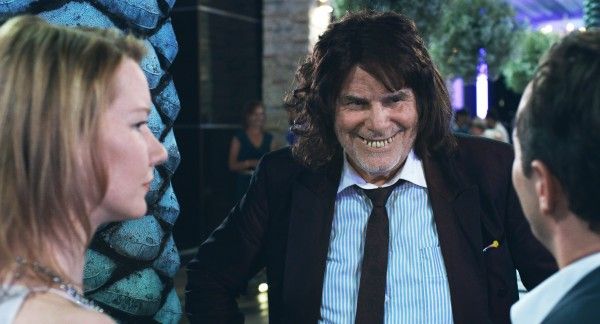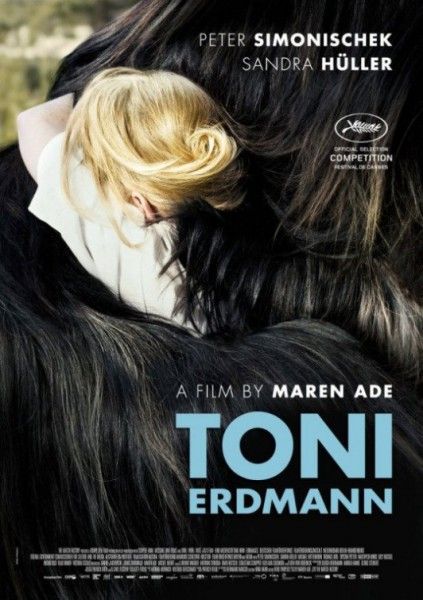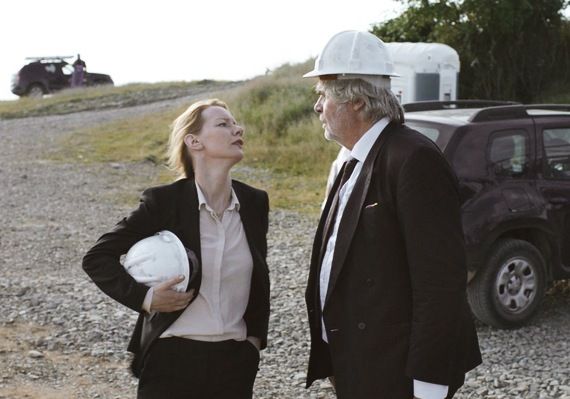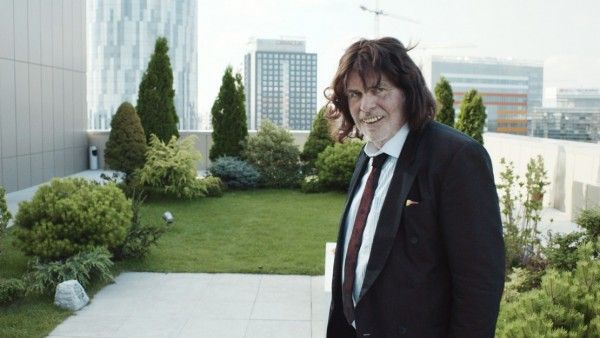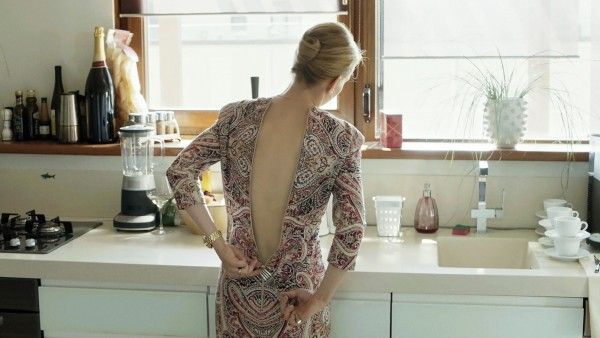I'm already on record in calling the screwball German father-daughter comedy, Toni Erdmann, one of the best films of the year. So it was delightful to talk to its writer-director Maren Ade about many of the screwball film's influences. We touched on the economic depression, globalization, Andy Kaufman and how the French-American double feature of My Father the Hero inspired her script.
How does Ade's film get all those influences into a film? It follows a father, Winifred (Peter Simonischek), who's created a crass-looking "life coach" alter ego named Toni Erdmann to infiltrate the globalized business class of his workaholic daughter, Ines (Sandra Hüller). Winifred/Toni travels to Romania where Ines works as an unwelcome birthday surprise. Sometimes he's himself, but when his daughter rebuffs him he changes into Erdmann; all foul teeth and awkward, he somehow slightly convinces CEOs that he's an important person just because he says he is. What follows is a hilarious comedy of discomfort and eventual familial release and understanding. It includes one of the wildest and lengthiest nude scenes you've ever seen, including a strange Bulgarian folk costume.
My discussion with Ade on all of these topics is below. Although there is discussion of nudity and a certain costume toward the end, Erdmann's antics are entirely concealed in this interview, so consider it spoiler free.
COLLIDER: I caught this film at Telluride and loved it.
MAREN ADE: Oh, great; how was that there? I couldn’t come, unfortunately.
There was a lot of laughter and a lot of gasps.
ADE: Ah, that’s good. That’s good to hear.
Since so many of the scenes involve reacting to an alter ego, did you have a strict script that they were sticking to in the scenes where he was Toni Erdmann or were the actors allowed to surprise each other?
ADE: Actually it was in ninety-five percent a script and especially in those scenes where he’s Toni. I have to say, it’s all scripted scenarios and written dialogue; there were little things that I sometimes I allowed a bit more improvisation with, but it was just little sentences that they added. Sometimes I allowed more improvisation and sometimes I would withdrew it again. In the many cases the improvisation was just too much because it would let a scene run longer and I’d learn that the scripted portions kept it tighter and the improvisation just elongated what was already tight.
Were there many different looks that you kind of considering for what Toni would look like? What was the processes of creating his look?
ADE: It was really a lot of work. It was crazy. First, every actor would have been a different Toni and actually Peter [Simonischek] already had the wig that we used when he was first auditioning; when I was first casting. But if you would’ve seen that wig in real life it looks like the most stupid joke ever. I mean it’s almost impossible to put someone in reality with that thing. But I still like that expression, from his fake teeth and Peter’s Toni smile. I like what type of a character he became a bit like this goofy guy and it his wig has this strange aubergine color. We tried probably 100 other wigs because I wanted to be sure that there’s not a better version. In the end we decided to take on the shooting day I changed again my opinion to that old one and it was very funny because the makeup artist said, “I knew you would make that decision and come back with that old thing.” Because I saw, once finally on set and through the main camera, that when everything was ready to go—it worked.
What do you think it is that made Toni be appealing to the businessman who was kind of shutting down Inez but invited Toni. Do you think people who were inviting him out were enjoying kind of that freak or just wanting to just see what he would do because everything in their life is so stilted?
ADE: While I was researching, I talked to several CEOs and managers, consultants and it was interesting that they really have these life coaches and people who do strange things with them. They are interested in strange things from anyone who says they’re a guru of any kind. So I found that this is something that really exists on one side and on the other side, the comedy, the idea that there’s this guy who’s an absolute clear no-go, because of the way he looks and what he’s saying, but he’s still surviving on the five-percent possibility that he might be important.
Well the movie’s very funny but one thing I really, really like about it as well is kind of like this subtle through line throughout the movie about this underlying feeling that globalization has kind of made our lives harder and a bit more empty. I guess can you talk about weaving in some of these social issues without like directly saying them?
ADE: I started with Ines as a character we probably all know, so I don’t have to go through all the details of the topical issues, but instead the methodology of her work raises a question about our world. I thought that it’s enough to see her stuck in that moment there, like she imprisoned herself in that idea of corporate success but still she’s a free woman who could change things and maybe she’s not aware of it. I was also interested to have that political conflict between the father and the daughter. I mean, he belongs to a very typical generation in Germany, the post-war generation that was very political and raised their children with a lot of warm human values and then sent them out into the world to be curious. But that generation also believed in this world without borders and also in an economy without borders but it’s their children who have to deal with it. Now, he’s confronted with that result in a way that everything turned against him in a way. She’s not home anymore and his view of the world for her is constricted and naive. I just wanted the film to touch that situation.
Was there any particular reason you chose Bucharest for her setting?
ADE: Bucharest is very interesting right now. After the end of Communism there was a big sellout of the country and everyone wanted to have a piece of that cake. Many German and foreign countries participated in sending their business there and so yeah it was very natural that a lot of consultants went there to like change the system and teach what’s right or wrong on how to generate profit. And I like the new wave of Romanian films right now, too. So it’d be fun to work there.
At least here—I’m not sure everywhere else—our reference point for this kind of film is old screwball comedies. Do you have any particular favorites yourself or directors or performers from that classic genre?
ADE: I mean I watched a lot of screwball comedies for this. Bringing Up Baby I like a lot and for sure I know all the Gene Wilder and Mel Brooks collaborations, but although I like those well regarded ones, for me it’s like what inspires me can also be not very cinefile. For example I like this movie I saw as a teenager and I think it’s very spiritually aligned with Toni Erdmann, the original is Mon ère, ce héros and it was remade in the US My Father the Hero.
Oh yeah and Gérard Depardieu was in both the French and the American one.
ADE: He was in both of them. I don’t know the American one is called, probably Cool Daddy, Cool.
It’s My Father the Hero here I think it translates the same. I’ve seen the American one but I actually haven’t seen the French one.
ADE: Shit. Oh god, what will happen to my film by association? [laughs]
I was like 12 when it was an American so my sister and I actually watched it a bunch.
ADE: Yeah, your sister, you see. Because it’s a nice father-daughter film because there’s also role play involved. She starts saying he’s her boyfriend to impress the older boys but he doesn’t know it and the whole Club Med does; he’s reacting differently towards her and so funny things come out of that.
Did the French one have a big water skiing scene like the American one?
ADE: Yeah, then there’s also a scene where she’s yelling “Daddy” because everything is coming out then because he almost dies in that scene. You know, that’s my reference for Toni Erdmann. [laughs]
I actually feel like I should watch the French one and the American one now. Definitely ones that we kind of discount when we’re an adult but entertained us when we’re young and we kinda stick by an accepted list of what’s youth entertainment still holds up in our adulthood and don’t really stray from that.
ADE: I did that for this film and also am constantly re-watching E.T.
I also wanted to ask about your use of knocks on the door because when I saw it in Telluride, I actually think is the a great film for people to watch with an audience because there are great audience reactions when Toni appears and does not appear but you expect him to. Every time there’s a knock at the door there’s a fear that he’s going to be there but even when he’s not there—you’re still wondering when is he going to show up?
ADE: That was really the only moment that I was really surprised that people are laughing because I never thought that could be the father knocking on the hotel.
Yeah, that hotel room scene where their was a knock my friend and I were both just like, “Oh my god.” There’s kind of a relief when he’s not there and an enjoyment when he is there.
ADE: Yeah, it’s both. I hope that's how people feel.
Let’s talk about his big costume change toward the end, was that giant furry costume made or is it something that is found in Romania?
ADE: It’s Bulgarian and it really exists like that. Actually they have big belts with them also they’re so heavy we took them away. But yeah it really exists like that...
In Bulgaria what occasion would someone dress up like for?
ADE: They work on their costumes very long and it’s really there for scaring evil spirits away and they do it at the beginning of the year. It’s a New Year’s costume for a mountain festival. They go in groups and dance and go in groups into the houses of the villages and dance there. Also, they interact with people and there’s also this idea that they, because it can be very scary when they do this because it’s very tall and there are no eyes, so yeah so that’s a Bulgarian tradition that also that creates this balance of being afraid at first but relieved afterwards.
Is there a name for that particular costume?
ADE: It’s called a Kukeri.
Because it is such a big scene is the party that becomes a nude party something that you originally conceived as a short film but thought would fit nicely with Ines’ need to empower and humiliate herself?
ADE: The naked party? I mean it’s almost like a whole short film in the film. I found out very quickly that I couldn’t shorten it because you really need to know how things come to together, that was unavoidable to have it as long as it is.
How do you view the use of nudity in this film? The purpose it is very freeing.
ADE: Yeah, it’s freeing. I found it interesting that I think that her becoming naked helped her to get a higher status than before because it’s so courageous. It made her stronger in that moment and not weake. In the first moment, how it starts, maybe she’s a bit ashamed but then it’s a strong gesture to do that. So this was something that through inviting nudity on everyone who witnesses her nudity, I found interesting that she finds herself and gets more self aware again.
I’ve seen Everyone Else and I’m a big fan of Miguel Gomes (Arabian Nights) and you’ve produced a lot of his films as well; how did you get involved in international film production with many different languages.
ADE: Actually I studied production at film school but from the beginning on I had the feeling that that was a mistake because I was very interested in writing and telling stories. So I pressured them to let me change the class for me and I made my own short film outside of the film production school. So they let me change to directing class but my studies were almost over so I did it as a graduation film, my first film. So then I have a company I started with Janine Jackowski and it’s very nice to have both a directing and producing means. I mean now with Toni Erdmann I had a lot to do and I didn't have enough time for producing but it really can be relief when you don’t have to be the one who has to be creative all the time.
What types of films are you looking for to produce?
ADE: Yeah, I mean they always need to take a risk in a way or have strong handwriting so that’s what we are looking more for than which topic could be successful or something. That also is a bit of a luxury in Germany, with public money for films, because we live in Berlin amongst many film funds, we don’t need so much money to live for ourselves. It’s a good place to work.
At Telluride they had an actor introduce your film and he had mentioned that Peter [Simonischek] is known for tragic theater in Austria, what took you to him?
ADE: I knew there were not so many left of his generation. Not many left who I knew who were radical enough that they really want this type of role because I really needed someone who is curious and open and not just offering his dramatic repertoire that he always does. Actually I haven’t seen him in theater before because he works in Austria and I don’t fly there to go watch theater. I just knew what he did and we met at the casting call for the first time and he had the wig and he was perfect.
My last question kind of goes back to how it’s sold and written up in the USA, in America when we think of confrontational alter ego comedy, we think of Andy Kaufman. I was wondering if there was any point of reference with him because Toni is occasionally tender...
ADE: Tony Clifton was not. [laughs]
Was Andy Kaufman any type of inspiration for Toni Erdmann?
ADE: I mean I like Kaufman and that was an inspiration, definitely that’s also why I put it the name Toni for him, but there was a big contrast between Winfried and Toni. I think Toni is funny but for his daughter his approach lets out some aggression with their relationship and some opinion of her and allows him to be more honest about things. It’s a status change or he’s bringing himself up at least on her eye level with Toni and he becomes more independent.
So Kaufman’s Clifton was like very much over the top, as a Las Vegas bar singer. But I like this contrast he works; the ability to contrast was something he was very good at. I mean this bit when he was doing those imitations but was very shy and would say, “I’m imitating someone,” and then he’d say, “Hi I’m Nixon” and that’s it. He does a few more and then he’d say, “I’m imitating Elvis.” And then suddenly he makes the perfect Elvis imitation and that’s so funny because it rewards the kind of morbid viewer, I have to watch it. I mean these things that he’s like reading the whole Great Gatsby and when people started booing he put on a record where he taped himself reading the Great Gatsby. It’s strange things like that that really liked. He’s a great entry point to discover that type of humor that Toni brings, but their methods of contrast are very different.
Yeah, Andy is kinda going for a gut punch and Toni is going for a pat on the head. Well thank you so much, I really cannot recommend this movie highly enough.
ADE: Cool, thank you very much!
Toni Erdmann is currently playing in Los Angeles and New York. It's currently perceived as the front-runner for the Best Foreign Language Film Oscar after making the category's condensed shortlist. Extra city expansion will follow in subsequent weeks.

